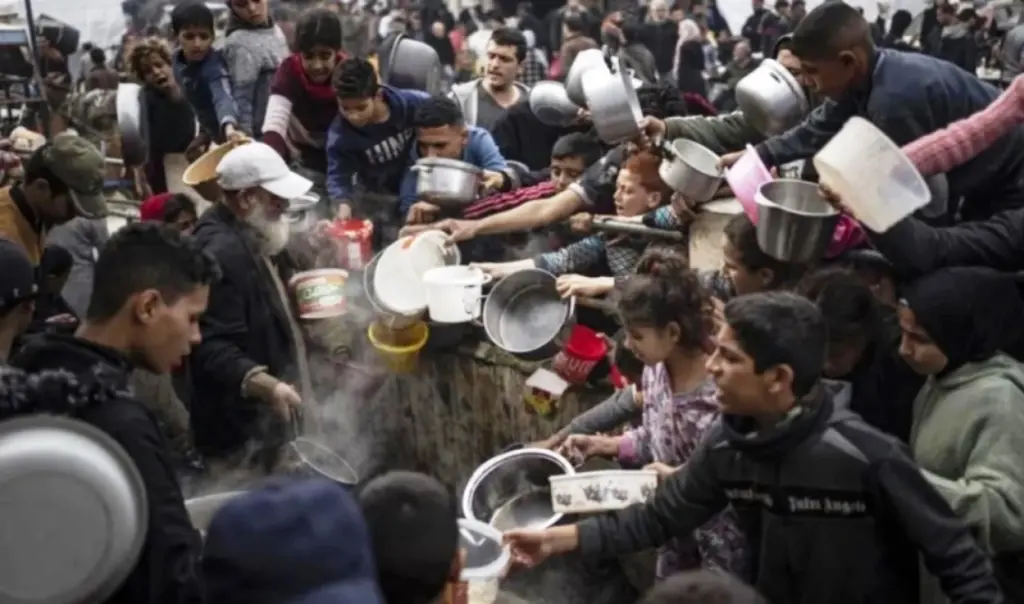With official recognition of famine by international experts and humanitarian organizations sounding the alarm for mass deaths from starvation, residents of Gaza are experiencing a tragic reality — a slow, agonizing death, while their children waste away before their eyes. “All my children have lost almost half their weight,” says Jamil Mougari, 38, from Maghazi in central Gaza.
“My five-year-old daughter now weighs just 11 kilos. My son Mohammad is skin and bones. We’re all like this. I myself lost 30 kilos.” He told the Guardian that he struggles daily just to stand upright in order to secure a little food for his family. “I often feel dizzy on the street. I have to hold myself together so I don’t collapse,” he says characteristically.
Gaza famine: “We’re dying slowly, our children are skin and bones”
Among the many tragic milestones recorded this week, the announcement by the IPC – the international committee for food security assessment – stands out, stating that the “worst-case famine scenario is in full development” in the Gaza Strip. The committee, consisting of UN experts and humanitarian organizations, calls for an immediate ceasefire to prevent further “human suffering.”
According to official Palestinian data, the death toll has exceeded 60,000, with the actual count estimated to be significantly higher due to thousands of people who remain buried under rubble from Israeli airstrikes.
Gaza: invisible and starving in the daily struggle for survival
Life in Gaza has become a daily survival struggle. Food is virtually non-existent and access to humanitarian aid is limited and dangerous. Families live on one plate of lentils per day – when they can find it. Often, they survive on water alone. Mougari’s family has changed shelter seven times since the war began. The hunger, however, remains the same in every corner of Gaza. “We borrow money to buy lentils when they’re available. Humanitarian aid doesn’t reach everyone. Those with weapons or power grab it and sell it at outrageous prices. How can the poor buy anything?” he says.
Four food distribution points operate in Gaza, but only for a few minutes each day. The scenes unfolding there are chaotic and often dangerous, with people falling victim to gunfire while waiting for a little food. 58-year-old Mansoura Fadl al-Helou doesn’t allow her only son to approach the aid queues. “I’m afraid they’ll kill him. I can’t bear to lose him,” she says. She herself is too weak to stand and go herself. “People push, fall down, it’s chaos. It’s very dangerous.”
“Humanity has forgotten us”
Abu al-Abed from Deir al-Balah describes how his children suffer from malnutrition. “My 14-year-old daughter’s ribs are now visible from weakness. And I myself can’t bear the hunger. Imagine my children,” he says. “We receive no help. There are no more soup kitchens. Market prices are outrageous and none of us has income.” With a voice that doesn’t hide his bitterness, he adds: “They mocked us all these years with talk of human rights. If we had asked for protection for Gaza’s animals, maybe they would have listened to us. But for humans, nobody moves. Neither Arabs, nor Muslims, nor Christians.”
Symbolic acts without substance
Even international diplomatic statements, such as the United Kingdom’s intention to recognize the Palestinian state if there’s no ceasefire by September, don’t inspire hope. “What does such recognition matter when we have no sovereignty or the right to self-defense?” wonders al-Helou. “We want real recognition, with rights and dignity, not just words.”
Mougari concludes with a cry of desperation: “I’m trying to endure, to find a little food for my children. We’ve sent countless messages to the world, but no one is moved anymore. We don’t know what else to say. All we have left is to shout: We’re dying slowly, save us from this tragedy.”




